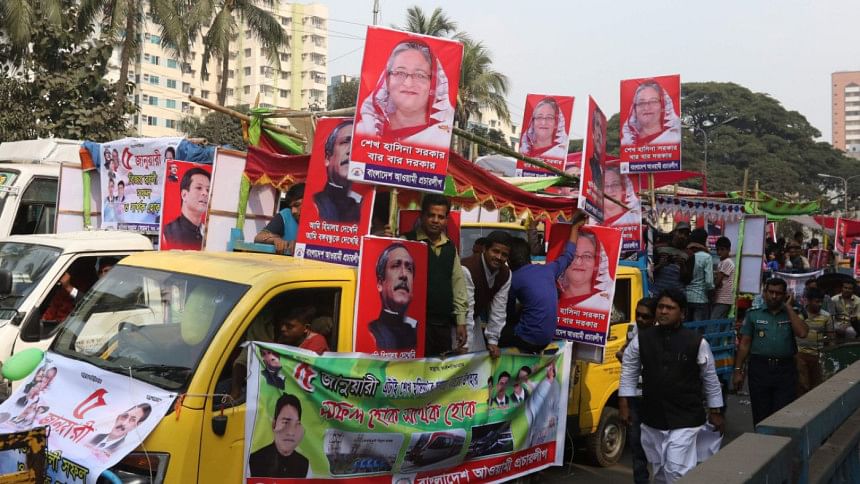Two years of the AL government

The government has got a lot to boast about on its two years in office. It has a firm grip on things and those who might try to convey otherwise, or say that there is instability in the country, might find it hard to back it up with substantive facts.
The occasion, predictably, was celebrated with all the fanfare by the ruling party, the day made even more memorable by the overwhelming results of the municipal polls held at the fag end of the year gone by. It was of little concern to the ruling party whether the public suffered the pain inflicted by long delays stuck on the streets for hours on end because the priority of the use of roads had to be accorded to the celebrating ruling party men moving as procession towards the meeting venue.
In fact, budding economists would be happy to learn about newer indicators of economic progress – we understand now that there is direct correlation between the severity of traffic snarl up and economic progress, those being directly proportional. We should now feel happy to spend more time on the roads in traffic jams because that speaks of our growing affluence. And through these ordeals, we are learning to be tormented for our own good; but hasn't a wise man said that those who torment us for our own good will torment us without end for they do so with the approval of their own conscience?
The political void created by the unique dispensation obtaining currently, apparent perhaps only to the perceptive eyes, has been hidden by the strides made in the economic front eliciting praise by our development partners, even from those that gave the country the short shrift to some of its iconic projects.
The economic front is really something to write home about. We have graduated to the low-middle income group with per capita income exceeding a thousand dollars (but that is no indicator of equitable income distribution), our GDP growth, although below 7 percent, is well over world average and our foreign exchange reserve is reaching the $30 billion mark (economists do not always see high reserve as a positive indicator).
On the security front, the militant activities that we witnessed in the last few months of 2015 had more to do with the internal political dynamics than external prodding or linkage, and have been stymied. But we will have to contend with the prospect of more people tilting towards extremist ideology, particularly the credulous ones among the Bangladeshi diaspora motivated by the two major international terrorist groups as was evident from the 28 Bangladeshi aspiring Islamists and ISIL supporters hauled up and deported by Singapore. And my contentions have been borne out by a recent survey by the International Republican Institute IRI).
While there is apparently no instability in the country, it would not be wrong to suggest that there is an undercurrent of discontent because of the way politics have been played out and the manner of holding the 2014 January elections, which was held with the help of an obliging and pliant election commission and a political party which has excelled in setting the lowest standards for itself and consistently failed to live up to those. Its politics without principles, at least of some of its members, have given a new meaning to the words ethics and morality.
The circumstances of the ruling coalitions getting voted to office for the second time may have been forgotten by the highly politically conscious Bangladeshis, and if there has not been a severe public outburst against it that is because of the destructive politics of the BNP and the totally reprehensible manner in which it targeted the people to vent its spleen against the government in 2015. But the outcome of it all has been a type of democracy that can at best be described as 'command democracy.' And one may draw an analogy with command or planned economy and the type of democracy that we are suffering today. Planned economy can provide stability but can also adversely influence growth and advancement if the government fails in judicious prioritisation of its allocation preferences.
Like a planned economy, which allows a hold on the resources of the state and dictate everything from prices to distribution so does a command politics which dictates every aspect of politics. And command politics may provide stability, like we are witnessing now, but may be counterproductive in the absence of the most important key to an inclusive democracy - an effective opposition. Thus whenever the next election is held, the manner of holding it would dictate the nature of things to follow. The IRI's finding in the same survey regarding the modus of holding election – a nonpartisan dispensation is still the preferred one by the majority of people polled – is worth considering.
The writer is Associate Editor, The Daily Star.

 For all latest news, follow The Daily Star's Google News channel.
For all latest news, follow The Daily Star's Google News channel. 







Comments